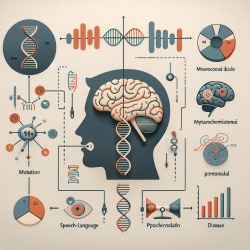Introduction
The recent study titled "POLRMT mutations impair mitochondrial transcription causing neurological disease" sheds light on the critical role of POLRMT in mitochondrial transcription and its implications for neurological disorders. This research is pivotal for practitioners in speech-language pathology, particularly those involved with children experiencing developmental delays and speech impairments. By understanding the mechanisms of POLRMT mutations, practitioners can enhance their therapeutic approaches and potentially contribute to further research in this domain.
Understanding POLRMT and Its Role
POLRMT is a mitochondrial RNA polymerase responsible for transcribing the mitochondrial genome. The study identifies mutations in POLRMT that lead to impaired mitochondrial transcription, resulting in various neurological manifestations, including global developmental delay, hypotonia, and speech/intellectual disabilities. These findings highlight the importance of mitochondrial function in neurological health and development.
Clinical Implications
The research identifies eight individuals from seven families with POLRMT mutations, presenting a range of neurological symptoms. For speech-language pathologists, these findings underscore the need to consider mitochondrial dysfunction as a potential underlying factor in children with speech and developmental delays. Recognizing these genetic influences can guide more personalized and effective intervention strategies.
Data-Driven Approaches in Therapy
Incorporating data-driven approaches into therapy is crucial for achieving optimal outcomes. The study provides a wealth of data on the molecular and clinical characteristics of POLRMT mutations, which can inform evidence-based practices in speech-language pathology. By leveraging this data, practitioners can tailor their interventions to address the specific needs of children with mitochondrial-related speech and developmental challenges.
Encouraging Further Research
The findings from this study open avenues for further research into the relationship between mitochondrial dysfunction and speech-language disorders. Practitioners are encouraged to collaborate with researchers to explore these connections and contribute to the growing body of knowledge. Such collaborations can lead to innovative therapeutic approaches and improved outcomes for children affected by these conditions.
Conclusion
The study on POLRMT mutations provides valuable insights into the genetic factors contributing to neurological and speech disorders. By integrating these findings into practice, speech-language pathologists can enhance their therapeutic strategies and support better outcomes for children. Continued research and collaboration in this field hold the promise of unlocking new possibilities for intervention and understanding.
To read the original research paper, please follow this link: POLRMT mutations impair mitochondrial transcription causing neurological disease.










